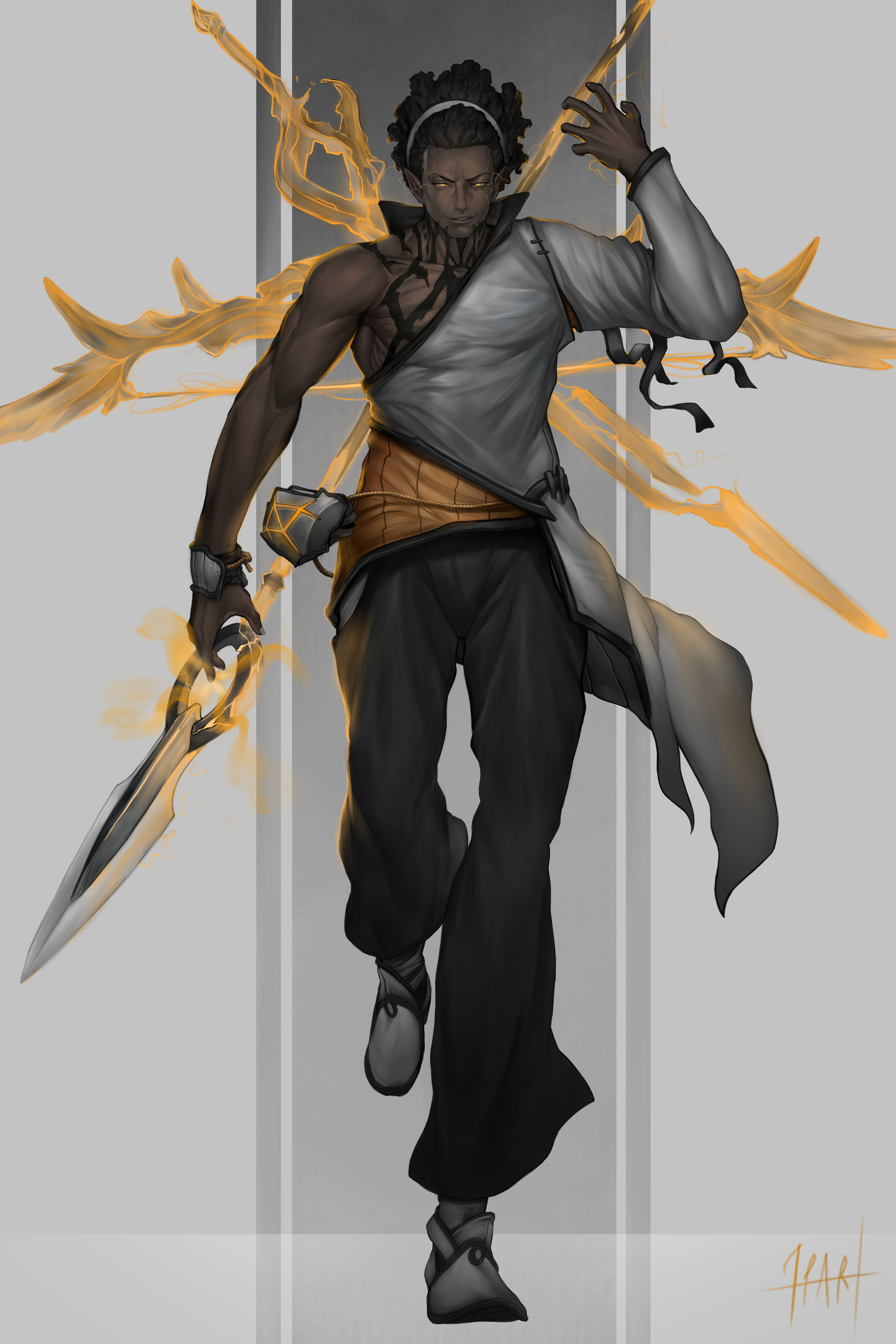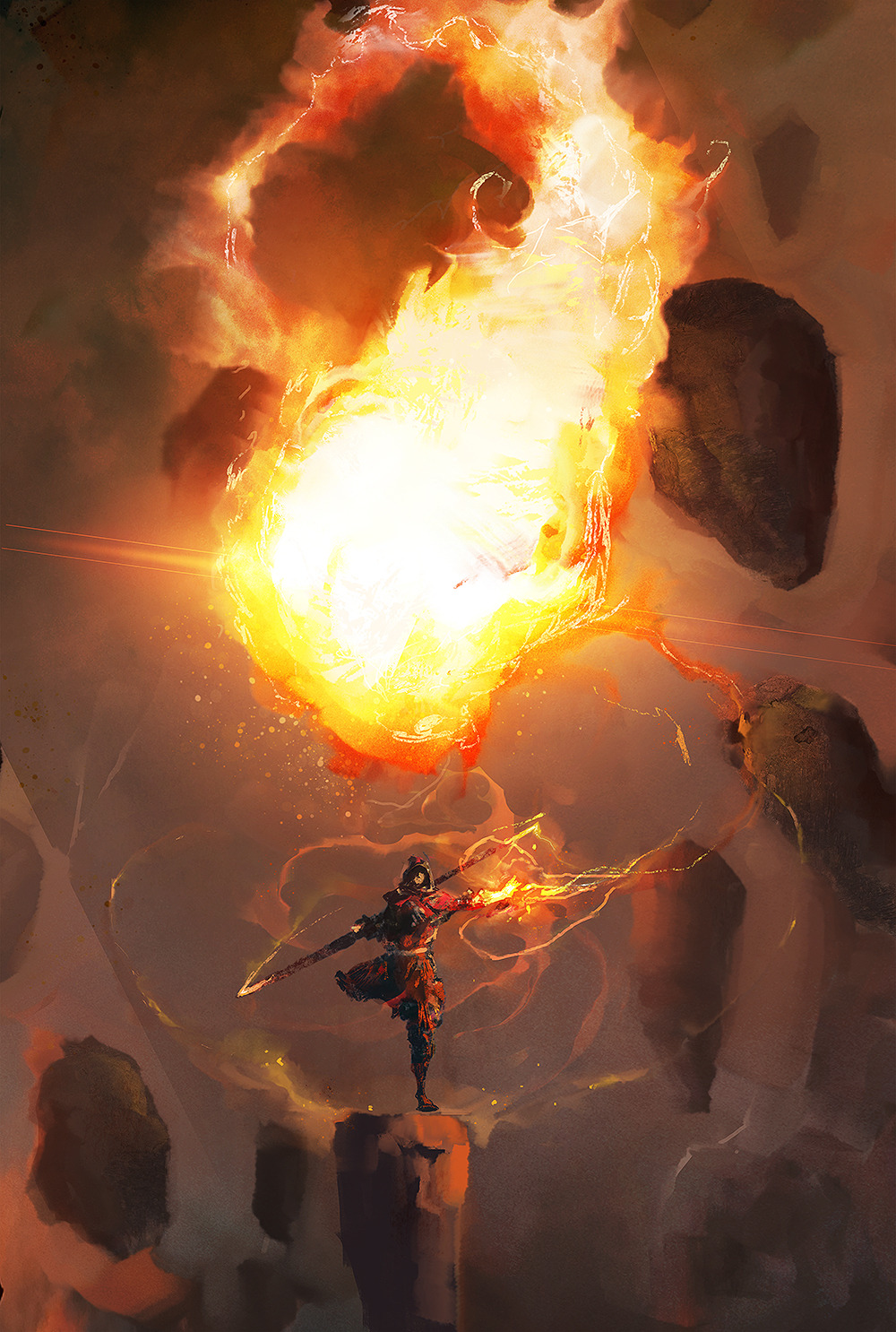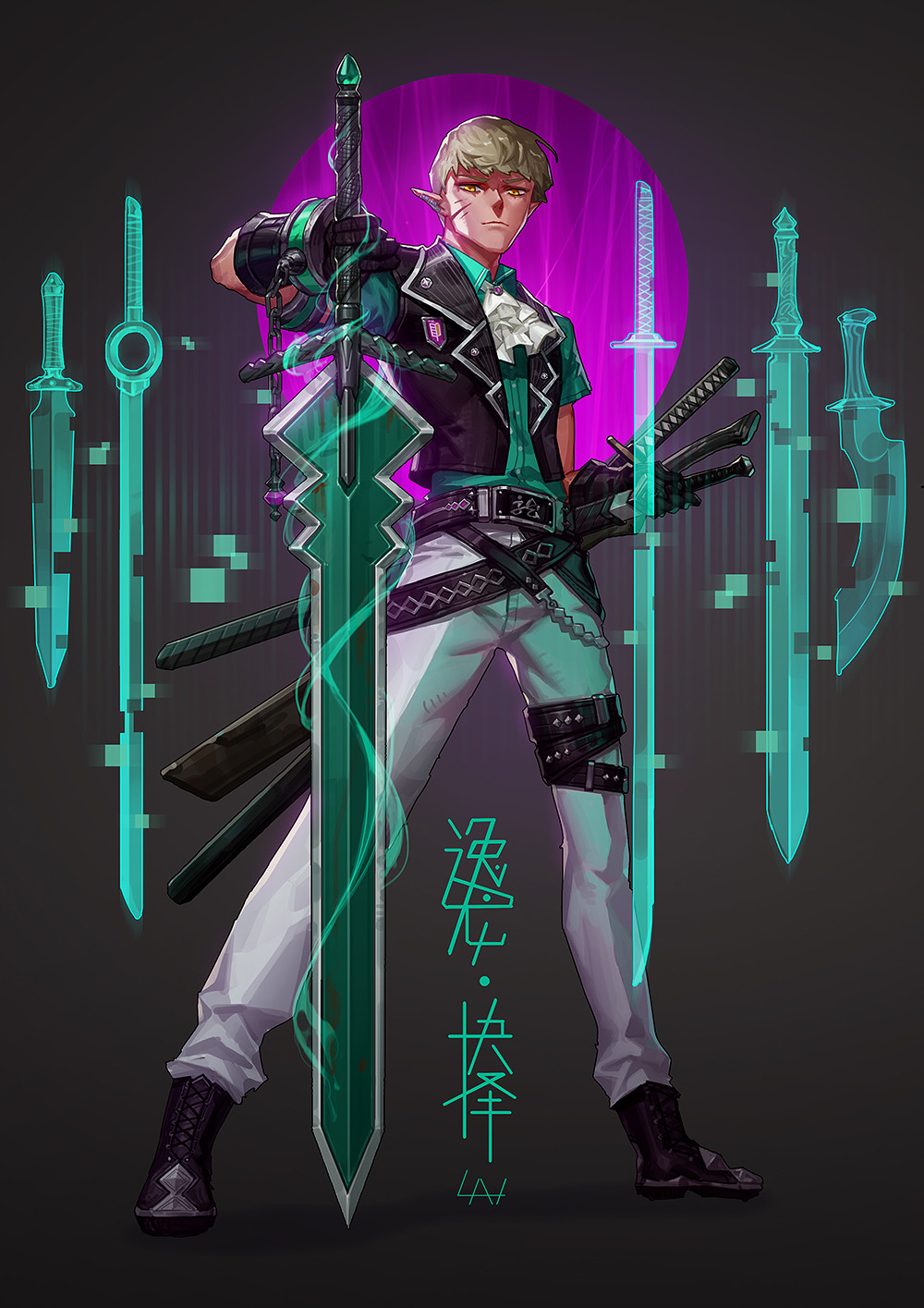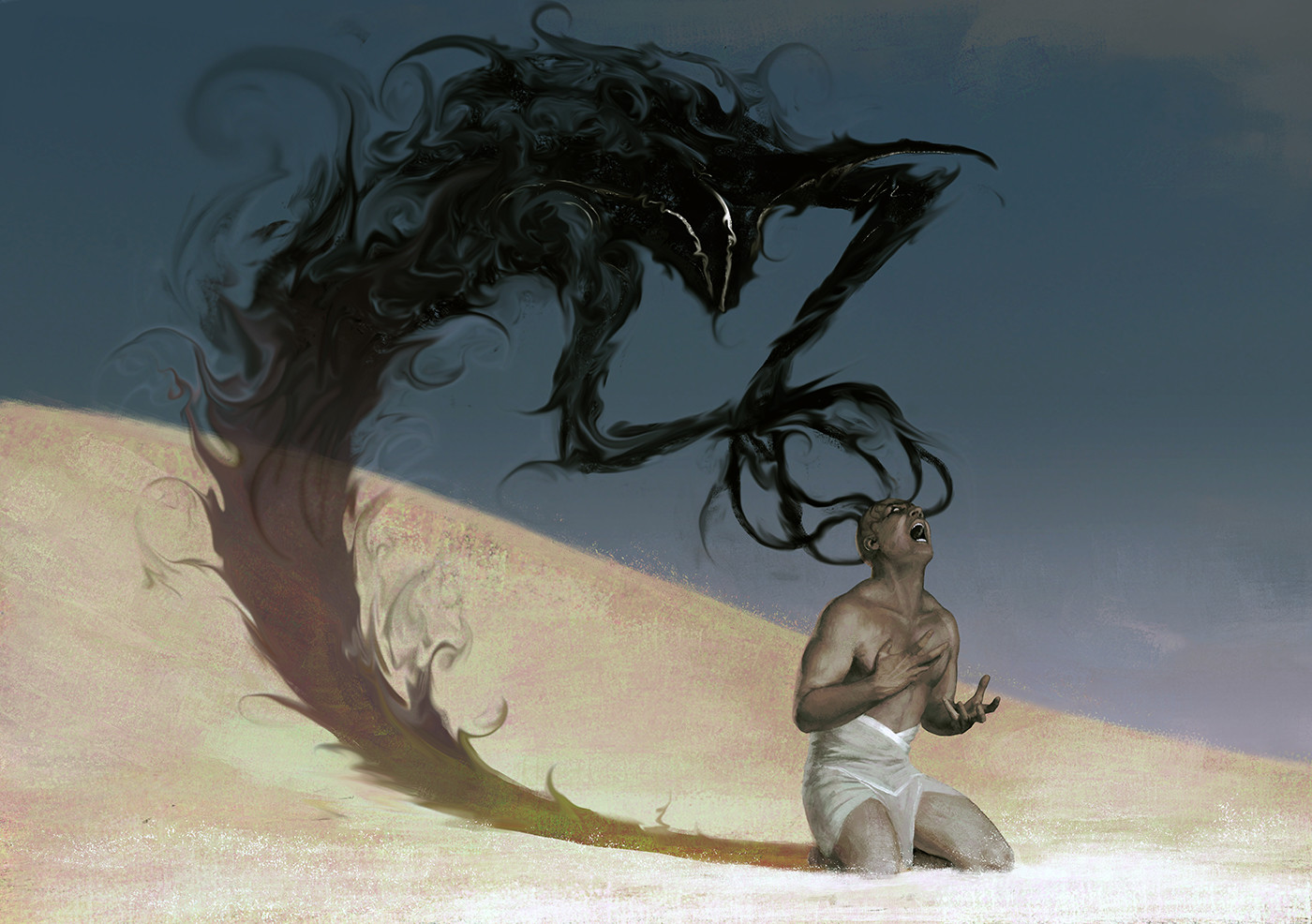
Cultivator
A dwarf flexes his fingers as the newest weapon disappears inside his core. Delighted by the prospect of mastering these new arms, he summons the weapon to his hands as he rises to charge his sparring partner. The hammer connects, knocking the opponent back and off balance, only to be instantly assaulted by the blades that replace the hammer in a flash.
While her enemies pour into the room to surround her, the elf calmly prepares her next move with energy crackling between her hands. When the moment is right, she vanishes in a burst of lightning. Her befuddled foes don’t realize that she’s now standing in the entrance behind them until she unleashed waves of electricity back into the chamber.
An orc drops from the roof, rolling with the fall to come back up running. Heading towards his companions, he can see they are blissfully unaware of the sorcerer preparing something devastating behind them. He throws his shield at the sorcerer and connects, buying him more time to arrive behind his party to generate a large shield of light and part the sea of fire that spews forth from the caster.
Cultivators are those who would learn powerful techniques to further their strength. They see every fight as an opportunity to grow, and every enemy is a treasure trove of experience waiting to be plundered. A cultivator often seeks physical perfection in themselves and their techniques.
A Foundation of Ki
Ki is a fundamental force that resides in all living and non-living things. Cultivators have learned ways to gather this power and accumulate it in an internal reservoir that they call their ‘foundation’. Drawing from this Ki reserve, they can perform secret techniques to create supernatural effects.
These techniques may have been passed on to a cultivator by an instructor or they may have learned it from an ancient manual. In rare cases, they might have even created one by themselves. Acquiring their technique is a significant event for a cultivator, as they will most likely be drawn to honing and perfecting it for the rest of their lives.
Pursuit of Perfection
"Civilize the mind, but make savage the body." Cultivators strive to grow their foundation to the highest peaks and to break through barriers in their cultivation as quickly as possible. This pursuit drives them towards combat, as the knowledge and experience gained in battle is crucial for their progress. Their single-minded pursuits cause many cultivators to live on their own, eschewing the crowds and comforts of city life. At the same time, cultivators readily join adventuring groups to meet their needs for combat, wealth and materials – all in service of further honing their craft.

Cultivator
| Level | Proficiency Bonus | Features | Ki Pool |
|---|---|---|---|
| 1st | +2 | Cultivator's Aura, Ki, Unarmored Defense | 1 |
| 2nd | +2 | Fighting Style | 2 |
| 3rd | +2 | Techniques, Technique Feature | 3 |
| 4th | +2 | Ability Score Increase | 4 |
| 5th | +3 | Extra Attack, Breakthrough | 5 |
| 6th | +3 | Aura Infusion | 6 |
| 7th | +3 | Technique Feature | 7 |
| 8th | +3 | Ability Score Increase | 8 |
| 9th | +4 | Of Sound Mind and Body | 9 |
| 10th | +4 | Auric Influence | 10 |
| 11th | +4 | Technique Feature | 11 |
| 12th | +4 | Ability Score Increase | 12 |
| 13th | +5 | Reforged Body | 13 |
| 14th | +5 | Aura Mastery | 14 |
| 15th | +5 | Technique Feature | 15 |
| 16th | +5 | Ability Score Increase | 16 |
| 17th | +6 | Cultivation Assault | 17 |
| 18th | +6 | Accelerated Infusion | 18 |
| 19th | +6 | Ability Score Increase | 19 |
| 20th | +6 | Ki Incarnate | 20 |
Creating a Cultivator
When creating a cultivator think about your characters background and their motivation. Becoming a cultivator is a path that takes dedication. Why is your character so dedicated to growing stronger? An unfortunate event? A role model? How did your character begin to learn their respective technique? Were they taught at a dojo with others, or under a master alone? It could even be as simple as a manuscript found in ruins.
What your cultivator is searching for, whether it be looming near or in the far future, can be important. Simple or not, something drives a cultivator to continue on their painful and arduous journey.
Quick Build
You can make a cultivator quickly by following these suggestions. First, make Strength or Dexterity your highest ability score, depending on your choice of weapon, followed by Intelligence. Second, choose the Far Traveler Background.
Class Features
As a cultivator, you gain the following class features
Hit Points
- Hit Dice: 1d8 per cultivator level
- Hit Points at 1st Level: 8 + your Constitution modifier
- Hit Points at Higher Levels: 1d8 (or 5) + your Constitution modifier per cultivator level after 1st
Proficiencies
- Armor: Light armor, medium armor, shields
- Weapons: Simple weapons, martial weapons
- Tools: Calligrapher's Supplies
- Saving Throws: Intelligence, Constitution
- Skills: Choose three skills from Acrobatics, Athletics, Deception, History, Intimidation, Sleight of Hand, Stealth, Survival
Equipment
You start with the following equipment, in addition to the equipment granted by your background:
- (a) a martial weapon and a Shield or (b) two Martial Weapons
- (a) a Longbow and 20 arrows or (b) two handaxes
- (a) a scholar's pack or (b) an explorer’s pack
(DM Note) Why not Wisdom?
This question has two answers actually. First, this class being so close to monk I wanted to distance it a bit. B, anyone who's read a lot of cultivation fantasy is aware of how different cultivating is in each universe. While Wisdom would definitely fit in a lot of them I particularly enjoy the idea of knowledge based cultivation. That is not to say that you can't switch the Intelligence based stuff to Wisdom or even Strength. It's your world, have at it.

Cultivator's Aura
Your intense training and tempering of your body has left you with the ability to physically exude your skill and power, allowing you to coerce or even physically affect others. As long as you have at least 1 ki point remaining your aura is active with a range of 10 feet, and has the following abilities:
- You may make Charisma based skill checks using your Intelligence modifier.
- Enemies that make a saving throw while in your aura do so at a penalty equal to half your Intelligence modifier rounded down.
- Your movement speed increases by 5 feet.
You may dismiss and reactivate your aura as a bonus action, and it is automatically dismissed once you become unconscious.
Ki
Your cultivation has begun to afford you to access to the condensed form of pure energy. Your access to this energy is represented by your ki pool. Your cultivator level determines the amount of ki you have, as shown in the Ki Pool column of the cultivator table. You may not have more ki than this maximum amount.
You can spend these points to fuel various techniques, stance abilities, and features. You start knowing three such features: Empowered Body, Relentless Pursuit, Spring Attack.
When you spend ki, that ki is unavailable until you finish a short or long rest, at the end of which you condense more ki, refilling your core.
Some of your technique and stance features require your target to make a saving throw to resist the feature’s effects. The saving throw DC is calculated as follows:
Cultivator Save DC
Empowered Body
You may spend 1 ki point to add your proficiency bonus to any Dexterity or Strength based skill check. If you are already proficient in the skill, then you instead double your proficiency bonus.
Relentless Pursuit
When an enemy adjacent to you would attempt to move, you may, as a reaction, spend 1 ki point to move up to your movement speed following that enemy.
Spring Attack
Whenever you take the dash action you may spend 1 ki point to make an attack as a bonus action.
Influx
As a reaction, whenever you would make a saving throw, you may spend a ki point to deactivate your Aura and give yourself a bonus to all of your saves equal to the Aura's penalty. This lasts until the beginning of your next turn.
Unarmored Defense
While you are not wearing any armor, your Armor Class equals 10 + your Dexterity modifier + your Intelligence modifier. You can use a Shield and still gain this benefit.
Fighting Style
At 2nd level, you adopt a particular style of fighting as your specialty. Choose a Fighting Style from the list of optional features. You can't take the same Fighting Style option more than once, even if you get to choose again.
Archery
You gain a +2 bonus to attack rolls you make with ranged weapons.
Close Quarters Shooter
When making a ranged attack while you are within 5 feet of a hostile creature, you do not have disadvantage on the attack roll. Your ranged attacks ignore half cover and three-quarters cover against targets within 30 feet of you. You have a +1 bonus to attack rolls on ranged attacks.
Defense
While you are wearing armor, you gain a +1 bonus to AC.
Dueling
When you are wielding a melee weapon in one hand and no other weapons, you gain a +2 bonus to damage rolls with that weapon.
Great Weapon Fighting
When you roll a 1 or 2 on a damage die for an attack you make with a melee weapon that you are wielding with two hands, you can reroll the die and must use the new roll, even if the new roll is a 1 or a 2. The weapon must have the two-handed or versatile property for you to gain this benefit.
Interception
When a creature you can see hits a target that is within 5 feet of you with an attack, you can use your reaction to reduce the damage the target takes by 1d10 + your proficiency bonus (to a minimum of 0 damage). You must be wielding a shield or a simple or martial weapon to use this reaction.
Thrown Weapon Fighting
You can draw a weapon that has the thrown property as part of the attack you make with the weapon. In addition, when you hit with a ranged attack using a thrown weapon, you gain a +1 bonus to the damage roll.
Two-Weapon Fighting
When you engage in two-weapon fighting, you can add your ability modifier to the damage of the second attack.
Unarmed Fighting
Your unarmed strikes can deal bludgeoning damage equal to 1d6 + your Strength modifier. If you strike with two free hands, the d6 becomes a d8. When you successfully start a grapple, you can deal 1d4 bludgeoning damage to the grappled creature. Until the grapple ends, you can also deal this damage to the creature whenever you hit it with a melee attack.
Techniques
You begin to devote your life to cultivating and perfecting one of many techniques. Choose a technique detailed at the end of the class description. Your choice grants you features at 3rd Level and again at 6th, 10th, and 14th levels.
Extra Attack
Beginning at 5th Level, you can Attack twice, instead of once, whenever you take the Attack action on Your Turn.
Breakthrough
At 5th level, you progress to the next step in your cultivation, strengthening certain aspects of your body. When you gain this feature you may choose one of two options:
- Your Speed increases by 10 feet.
- Your hit point maximum increases by 10.
You may choose either of these options again at 10th, 15th, and 20th level.
Aura Infusion
Upon reaching 6th level, you harness the beneficial aspects of your aura to accelerate your body's natural healing. As a bonus action you may spend 1 ki point to heal yourself for 2d4. You may instead use an action and 2 ki points to touch and heal another creature for 2d4.
Of Sound Mind and Body
At 9th level, your mastery over ki allows you to better safeguard yourself mentally and physically. When you are subjected to a spell or effect that allows you to make a Constitution or Intelligence saving throw to take only half damage, if you succeed, you instead take no damage.
You do not gain the benefit of this ability when you are unconscious.
Auric Influence
Beginning at 10th level, your aura control has become subtle enough to continually influence those you would interact with. You may choose one additional Charisma based skill to gain proficiency in.
Additionally, whenever you make a Charisma based skill check, you can spend 1 ki point to reroll it and take the second result.


Reforge the Body
When you reach 13th level, you begin to integrate materials into your cultivation to reforge your body, tempering it with the flexibility of the elements. You gain resistance to one damage type of your choice. You may change this choice over a long rest.
Aura Mastery
At 14th level, you become adept at manipulating your aura to gain a multitude of information from it, affect a larger area, or focus its effects on a single enemy.
As an action you may extend the range of your aura to 30 feet until the end of your next turn. While the range is extended you are aware of any creatures, living or otherwise, within your aura. This ability does not tell you their location, only that they are within your aura.
You may choose to instead, as an action, focus your aura on one creature to enhance its effect. You may choose only one target for your Culitvator's Aura ability within 30 feet and spend 1 ki point, the saving throw penalty increases by 1 and you have a bonus to your attacks to hit that creature equal to the total penalty. This second ability lasts for a minute and can only be used once per short rest.
Cultivation Assault
Upon reaching 17th level, you learned to assail an enemy's core using your cultivation technique to damage and/or shatter it. As long as you have at least 1 ki point, when you damage a creature with an attack, you can cause that attack to deal extra damage equal to half your Cultivator level. You may use this ability a number of times per short rest equal to your Intelligence modifier (minimum once).
Additionally, whenever you would reduce a creature whose CR is no lower than half your level to 0 hit points, you regain all uses.
Accelerated Infusion
At 18th level, the speed at which your aura heals you and others has increased. Your Aura Infusion healing increases to 2d8 and you may touch other creatures as a bonus action to heal them.
Ki Incarnate
Beginning at 20th level, you are ki made flesh. You may use ki features despite having no ki. Whenever you do so, you take 1d4 force damage for each ki point used and your maximum health is reduced by the damage taken. This damage can't be reduced in any way and lasts until your next long rest.
Techniques
Iaijutsu
A master of the Iaijutsu technique spends their training time drawing and sheathing their weapon. These cultivators are able to instantly draw their weapons to deliver punishing attacks or devastating counterattacks. A truly focused Iaijutsu user can become a wall of blades, cutting down any and all attacks.
Flash Draw
While assuming either of your stances you may draw and sheathe one weapon as part of any and every attack you make. This weapon must deal slashing damage, and cannot have the heavy property. Enemies can also provoke opportunity attacks from you even if you haven't drawn this weapon.
Iai Dice
You gain a die that is used with your stances and features called the Iai die. It begins as a 1d4 but increases with your level as shown below. Features that use this die can only be used with weapons that fit the prerequisites of Flash Draw. You may only add the die up to twice for damage rolls.
| Level | Die |
|---|---|
| 3 | 1d4 |
| 5 | 1d6 |
| 9 | 1d8 |
| 11 | 2d6 |
| 13 | 2d8 |
| 17 | 3d6 |
Stances
Starting at 3rd level, your technique allows you access to knowledge on how to use ki internally for defensive abilities and externally for offensive ones.
You can choose the external or internal stance before you roll for initiative, unless surprised. Otherwise, entering or switching between stances is a bonus action. Unless otherwise noted, you can only use the abilities and benefits granted by each stance while you're in it.
You are unable to use stances while you are incapacitated. If you are incapacitated while in a stance, you may regain either stance as a bonus action.
Internal Stance
-
If you have not moved since the beginning of your last turn, then as your turn begins, you may spend 1 ki point to gain blindsight and reach equal to your aura range until you move or are moved.
-
You may take the dodge action as a bonus action as long as you have not moved and will not move this turn.
-
As you take the attack action, you may gain a bonus to AC and saves equal to half your proficiency bonus rounded up, but you take an equal penalty to your attack rolls. This bonus and penalty lasts until the beginning of your next turn.
External Stance
-
You can spend 1 ki point to gain advantage on initiative checks when rolling initiative.
-
When in this stance, your AC is decreased by half your proficiency bonus, however, you add your Iai die to your weapon damage rolls.
-
If you would attack a creature that has not yet acted in combat you instead add your Iai die twice to the damage rolls.
Iai-goshi
Upon reaching 7th level, you master the first position of of this technique; using a single strike to fell an army. Twice per short rest you may, as an action, make a single melee attack roll against every enemy within your reach.
Tachi-ai
When you reach 11th level, your practice has allowed you to master the next stance of this technique, capitalizing on your enemies mistakes. While in internal stance, enemies provoke opportunity attacks when they would leave any square in your reach.
Additionally, you add your Iai die to your weapon damage rolls for attacks made as reactions, and while in external stance you would instead add your Iai damage die twice.
Kennokabe
At 15th level, you have developed the perfect defense and offense. You may spend 1 ki point to gain and take a reaction any time one would be triggered. You may do this a number of times per long rest equal to your Intelligence modifier.
Additionally, when you are about to take damage from a spell, melee, or ranged attack roll, you may make a weapon attack as a reaction. If you are in external stance, this attack is always made at disadvantage. If your roll is higher, then you roll your weapon damage adding your Iai dice, and subtract that from the damage you would take. If the damage is fully negated, you can redirect the attack back to its source, forcing the attacker to target itself with its attack using your attack roll.


















Falling Phoenix
Cultivators learning the Falling Phoenix technique have a predilection for fire. Some particularly enjoy raining it from the heavens, and seize on any chance to do so.
Conjured Phoenix
Beginning at 3rd level, you are able to conjure a small, ever burning replica of this techniques namesake. You gain the cantrip Create Bonfire, and add your Intelligence modifier to the damage dealt by it. You add double your Intelligence modifier at 5th level and triple at 11th.
Stances
Starting at 3rd level, your technique allows you access to knowledge on how to use ki internally for defensive abilities and externally for offensive ones.
You can choose the external or internal stance before you roll for initiative, unless surprised. Otherwise, entering or switching between stances is a bonus action. Unless otherwise noted, you can only use the abilities and benefits granted by each stance while you're in it.
You are unable to use stances while you are incapacitated. If you are incapacitated while in a stance, you may regain either stance as a bonus action.
Internal Stance:
-
You gain resistance to fire damage as long as you are in this stance.
-
You may spend 1 ki point per creature as a reaction to give those creatures within your aura fire resistance as long as they remain within your aura and you remain in this stance.
External Stance:
-
You take fire damage equal to your proficiency bonus every turn whenever you would deal fire damage with a cultivator ability or feature while in this stance. You only take this damage once per turn and it ignores resistance and immunity.
-
When you would deal fire damage with a cultivator ability or feature you double the number of dice you roll. E.g. Create bonfire would deal 2d8 at 3rd level instead of 1d8.
Phoenix Fall
Starting at 7th level, you learn to rain a flock of phoenixes on a flock of foes. You may cast Burning Hands using 3 ki points.
Additionally, whenever you cast Create Bonfire, you may make an attack as a bonus action.
Phoenix's Vestment
Upon reaching 11th level, you gain resistance to fire damage. Whenever you are in your internal stance you instead gain immunity to fire damage.
Additionally, your abilities ignore fire resistance, and treat fire immunity as fire resistance.
Winged Wildfire
At 11th level, your control over fire lends you the most potent and notable aspects of the phoenix. While in your external stance you gain fiery wings and a fly speed of 60 feet.
While in internal stance you may spend 1 ki point to cast Feather Fall a number of times per day equal to your Intelligence modifier.
Phoenix Arisen
Beginning at 15th level, you begin to personify every aspect of the powerful phoenix. When an attack would reduce you to 0 hit points, you may instead fall out of your current stance and be reduced to 1 hit point and 0 ki remaining. The attacker takes 2d8 + 1d8 fire damage per ki point you had left before you were reduced to 0.
Once you use this feature, you cannot use it again until you take a long rest. The damage you deal increases to 2d10 +1d10 per ki point fire damage at level 18. This damage is not affected by the external stance.


Four Winds
Masters of this technique manipulate the four winds to devastate and control the field around them. They're often some of the fastest fighters on the battlefield, with practitioners frequently augmenting themselves and the area around them using these winds generated or controlled by ki.
Stances
Starting at 3rd level, your technique allows you access to knowledge on how to use ki internally for defensive abilities and externally for offensive ones.
You can choose the external or internal stance before you roll for initiative, unless surprised. Otherwise, entering or switching between stances is a bonus action. Unless otherwise noted, you can only use the abilities and benefits granted by each stance while you're in it.
You are unable to use stances while you are incapacitated. If you are incapacitated while in a stance, you may regain either stance as a bonus action
Internal Stance:
-
Your movement and the movement speed of all allies within your aura is increased by 10 ft. This increases to 20ft at level 10. Allies moving through your aura retain half of this bonus upon leaving until the end of the turn.
-
You may use Acrobatics, and Dexterity for high jumping and long jumping, and you no longer need a running start.
-
You may spend 1 ki point to dash as a bonus action. When doing so, your movement does not provoke opportunity attacks.
External Stance:
You may activate one of the listed effects when switching to this stance, replace an attack, or as a bonus action, but only once per turn:
-
Wind Ward - All enemies within your aura must make a Strength saving throw. On a failure, they take 1d6 bludgeoning damage and are pushed out of your aura. They take half damage and are not pushed on a success. This damage is increased to 2d6 at level 10 and 3d6 at 15th.
-
Airbind - Choose an enemy within your aura. They must make a Strength saving throw. On a failed save they take 2d6 bludgeoning damage and their movement is reduced to 0 until the end of their turn. On a success, they take half damage and no reduction to their movement. This damage is increased to 4d6 at level 10 and 5d6 at 15th.
-
Storm Pulse - Choose an enemy within 30 feet. They must make a Strength saving throw or be pushed 20 feet directly away from you.
Enemies not completely in your aura, such as huge sized creatures, have advantage on saves against Wind Ward and Airbind.
North Wind
Beginning at 7th level, you become the north wind itself. As a reaction, whenever an enemy ends their turn, you may take an extra turn. During this turn, your movement does not provoke attacks of opportunity, and your movement speed is doubled.
Additonally, a warding breeze guards you, blowing away any mist or gases such as Stinking Cloud or Fog Cloud. Once you have used this feature, you may not do so again until you take a long rest.
South Wind
At 11th level, using the hot southern winds you to propel yourself through the skies. You gain a fly and hover speed equal to your movement speed when in internal stance.
East Winds
Upon reaching 15th level, you may instantly call upon the destructive power of the eastern winds. You may spend 5 ki points to cast Whirlwind. You may spend an additional 2 ki points to become immune to the effects of the spell. You may use this ability once per long rest.

Ki Fortress
Ki Fortress adepts are taught that the best offense is a perfect defense. They learn that the shield should be the first weapon you grab, not the sword. Disciples of the technique strive to become and impenetrable wall between their allies and those who would do harm.
Ki Shields
Upon reaching 3rd level, you begin to steer your cultivation towards the arts of shield usage and creation. Shields are now a d6 light versatile (d8) bludgeoning weapon for you. You may don a shield with the same Use an object action you use to draw it. Magic shields that have bonuses to AC also apply the same bonuses to any attack and damage rolls you make with those shields.
Furthermore, you gain the ability to cast spells, using your shield as a magical foci. You now know the cantrips Blade Ward and True Strike, and you may target a number of creatures equal to your proficiency bonus within your aura whenever you cast them.
Lastly, you may spend 1 ki point and cast the 1st level spells from the list below using Intelligence as your spellcasting modifier. You may cast 2nd level spells from the list below using 2 ki points at 9th level, 3rd level spells using 3 ki points at 13th level, and 4th level spells using 4 ki points at 19th level. You may cast any spell from the list below as a bonus action.
When you gain the ability to cast higher level spells, you may spend 1 ki point per spell level to cast lower level spells at your highest level.
| Spell Level | Spells |
|---|---|
| 1 | Shield, Shield of Faith, Tenser's Floating Disk |
| 2 | Immovable Object, Warding Bond, Warding Wind |
| 3 | Intellect Fortress, Spirit Guardian, Wall of Sand |
| 4 | Fire Shield, Stoneskin, Wall of Fire |
Shield Legerdemain
Beginning at 3rd level, you master the ability to harden sections of your aura, granting protection to yourself or those around you. You may spend a ki point cast Shield as a reaction when an ally within your aura is about to be hit by an attack. When you cast the spell in such a way, you may target the ally with the spell.
Force Shields
At 7th level, your mastery has extended to physical shields as well as metaphysical. You may make a thrown weapon attack with an energy version of your shield, with a range of 15/30 using Strength for attack and damage rolls. It deals 1d6 force damage plus your Strength modifier and additional damage equal to any magic AC bonuses imparted by the shield. The shield shatters on impact.
Additionally, you may apply the bonuses to AC granted by a single shield on your person to your saves. This effect ends when you are rendered unconscious.
Last Bastion
Upon reaching 11th level, saving your allies has become your prerogative. As long as you have 1 ki point remaining, you may use a bonus action to brace yourself. Until the end of your next turn, your movement speed becomes 0, you act as three-quarters cover for creatures medium size or smaller in a 15 foot cone behind you, and you gain a +2 to your AC and saving throws.
Destructive Shielding
Starting at 15th level, your shield usage has reached a deadly efficiency. When you hit an enemy with an attack using a shield, you may use up to 3 ki points to do an extra 1d8 damage, plus 1d8 per ki point used after the 1st. Additionally, when you land a critical hit on an enemy, you may make a single extra attack as part of that attack action.


Taiji
Known as the technique that pursues the oneness of everything. The ultimate whole of every state. Taiji disciples practice balancing opposing forces to achieve perfect harmony with the universe. These disciples, while seemingly docile in their slow and inexorable practice of forms, use their mastery of these skills to leverage opposing forces with dangerous effect.
Reclamation
Beginning at 3rd level, you gain the ability to cast absorb elements. You may do so twice per short rest. You gain a third use at level 10.
Stances
Also at 3rd level, your technique allows you access to knowledge on how to use ki internally for defensive abilities and externally for offensive ones.
You can choose the external or internal stance before you roll for initiative, unless surprised. Otherwise, entering or switching between stances is a bonus action. Unless otherwise noted, you can only use the abilities and benefits granted by each stance while you're in it.
You are unable to use stances while you are incapacitated. If you are incapacitated while in a stance, you may regain either stance as a bonus action
Internal Stance
-
Once per turn, whenever you would reduce damage done using your absorb elements, you regain a number of ki points equal to half your proficiency bonus. If you have no ki points, you instead gain a number of ki points equal to your proficiency bonus.
-
All allies within your aura gain advantage on saves from spells and abilities dealing fire or cold damage.
External Stance
Whenever you would take the attack action, you may apply one ability listed below to your attacks. Additionally, you may instead spend 1 ki point to apply all of the below abilities to your attacks.
While in this stance:
-
You may use your Intelligence modifier for unarmed attack and damage rolls.
-
You add your Intelligence and Strength modifier as additional damage for unarmed attack rolls.
-
Your attacks within your aura ignore half and three-quarters cover.
-
The range of your attacks increases to the range of your aura.
-
Your attacks may use fire or cold damage instead of their original damage type.
At 6th level, all your attacks while in this stance do an extra 1d4 fire or cold damage. This increases to 1d6 at 12th level and 1d8 at 18th.
Duality
Upon reaching 7th level, you grow your knowledge of the whole of life's many aspects, allowing you to harness the world's numerous dualities. All stance abilities referring to fire and cold damage may now be changed to poison and acid, or lightning and thunder damage. At 10th level, all stance abilities referring to fire and cold damage may now also be changed to radiant and necrotic, or psychic and force damage.
Additionally, you may use absorb elements for any elemental damage type you have access to regardless of whether you have chosen that damage type or not.
You can only choose one set at a time and you may choose a different set after a short or long rest.
Elemental Void
At 7th level, you learn to drain the energy around you. Whenever you use your Absorb Elements to reduce damage you may, as a reaction, swap your chosen damage type with Duality to any other set you have access to.
Additionally, you gain resistance to the absorbed element for a number of rounds equal to your Intelligence modifier.
Balance in Nature
Beginning at 11th level, you are able to enact your will upon elemental forces around you. You can cast Absorb Elements when an ally would take elemental damage. When you cast the spell in this way, the effects of absorb elements apply to all creatures within your aura range.
Furthermore, you may make an extra unarmed attack as a bonus action, as long as you have spent a minimum of 1 ki point this turn.
Wuji
Starting at 15th level, you have reached the pinnacle of balance and control. While in external stance, your attacks ignore your chosen elements damage resistances, and you treat those same immunities as resistances.
While in internal stance, as a reaction, if an ally saves against a spell or ability that would have them take half damage, you may spend 1 ki point per ally in your aura to instead have them take no damage on a success. You may use this ability a number of times per day equal to your Intelligence modifier.


Ki Caster
Ki casting users are most known for their inexhaustible ammunition, ranged, and close quarters combat prowess. Another notable feature is their Ki Construct technique. Arrows made from their ambient auras that host a slew of versatile abilities. These constructs leave the cultivator with the ability to be adaptable to many situations.
Aura Cast
Starting at 3rd level, you learn to utilize your aura to create physical ammunition. As a part of each of your attacks, you may summon an arrow or bolt to attack with. This ammunition is magical for the purposes of overcoming resistances and deals 2d4 force damage. This ammunition requires a ranged 2-handed weapon to shoot. The ammunition’s damage die increases to 2d6 at level 10. This damage replaces the normal weapon die damage, but is still affected by magical bonuses. It dematerialises upon hitting or missing a target, and making one when another exists causes the older one to disappear, unless stated otherwise.
Additionally, when you ready an attack, the ammunition does an extra 1d10 damage. It is lost if it is not shot by the end of your next turn, and the extra damage is wasted.
Constructs
Beginning at 3rd level, you are able to apply aura configurations to your ammo when you create them.
When you make a ranged attack roll against an enemy using your aura cast feature, you may infuse your attack with additional spiritual energy. You gain additional abilities called Constructs, which may be applied to ranged attacks.
Once a turn, when you make a ranged attack roll against an enemy, you may spend 1 ki point to infuse the attack with a construct. At 9th level, you may spend 2 ki points to apply 2 constructs to a single attack, and at 17th level you may spend 3 ki points to apply 3 constructs to a single attack.
You know 3 constructs at 3rd level from the list at the end of this subclass, and learn one more at 9th and 17th level.
Point-Blank Shot
At 7th level, you learn how to make summoned ammo even more lethal in close quarters. Once per short rest, as an action, you may make a ranged attack roll with a range of 5 feet. On a hit, the attack is considered a critical.
This critical does not double the damage from Constructs.
Sharp Shooting
Beginning at 11th level, your skill and talent at shooting lends you a deadly accuracy. Whenever you would roll damage for a summoned arrow, you may add your Intelligence modifier to that roll. If you do so while attacking without using a construct, you regain 1 ki point on a d20 roll of 10 or higher. This additional damage is doubled on a critical hit.
You may use this a number of times equal to your Intelligence modifier. You regain all uses after a short rest.
Suppressing Fire
Starting at 15th level, you've become a spell caster's bane. As a reaction, when an enemy within your weapon's first range casts a spell, you may make a ranged attack roll against them. This attack cannot be made at advantage. If the attack hits, you do no damage, but the enemy must make a concentration save as if it were concentrating on a spell with a DC equal to your cultivator save DC. On a failure, the spell fails, and the slot is wasted. You may do this twice per long rest.
Constructs
Echo Arrow
If you hit an enemy with this arrow then you may choose another enemy in range. If the chosen enemy or the original target takes damage before the beginning of your next turn, the other takes additional damage equal to your arrow damage die.
Fester Shot
When you damage an enemy with this ranged attack, you reduce that enemy’s max hit points by the same amount. This effect ends after a long rest. At 10th level, this attack deals an additional 1d4 necrotic damage at the beginning of each of the enemy's turns and reduces their max hit points by the same amount. This additional damage bypasses immunity and resistances and ends if the enemy has not been hit by one of your arrows for 1 round.
Brake Arrow
When an enemy is hit by this arrow their movement speed is reduced by 15 feet. This effect stacks and goes away at the end of its next turn. At 10th level, the target makes a Dexterity save, on a fail, the affected enemy may not move using legendary actions or reactions.
Mesmer Arrow
If this arrow hits then the target makes a Wisdom saving throw with advantage or is charmed by you until the start of your next turn. You may choose to have this arrow deal no damage. A creature who succeeds on this check is immune to this effect for 24 hours.
Cannon Cast
When this arrow strikes a creature or surface, the target and creatures within 10ft take an additional 1d6 force damage and are knocked prone. A successful Strength saving throw negates the prone condition. This arrow deals double damage to structures. At 10th level this damage increases to 2d6.
9th level Constructs
Drill Tip
This arrow can be shot through stone or wood no thicker than 5 feet. Additionally, when shot directly at a creature, this arrow can pierce a number of added targets equal to your Intelligence modifier. Each additional target must be directly behind the first. When shot this way, each enemy hit takes an additional 1d6 damage.
Aura Burst
If an enemy hit by this arrow is in your aura they take an additional 3d6 weapon damage.
17th level Constructs
Aura Suspension
When you fire this shot you may instead have it hang within your aura. At the beginning of each of your turns this arrow will automatically fire at the closest enemy. Each shot takes the same amount of ki and has the same constructs as the first shot. You may end this ability as a bonus action.
Named Arrow
You may take a penalty to your attack roll to target specific body parts with this shot and cause an effect when it hits.
- Torso -2 Push the target back 10 feet.
- Legs -3 Reduces targets movement speed to 0 until the end of their next turn. A successful Dexterity save reduces this to half their movement speed.
- Arms -4 Gives the target disadvantage on all attacks for 1 minute. They make a Constitution save at the end of each turn to end this effect.
- Head -5 The target makes a Constitution save or becomes stunnned for 2 turns. The target may make another Constitution save at the end of each turn to end this effect.

Soul Arms
This technique is taught to those who excel and meditative introspection. This is due to the required ability to find a soul space with which to house the weapons that will become your soul arms. The users of this technique will find themselves turned into whirlwinds of blades, storms of strikes, and never without a weapon.
Armory
When you choose this technique at 3rd level, you gain a soul space with which to house your chosen weapons, and the ability to substitute them in battle instantly. You may choose up to your proficiency bonus in magical or non-magical weapons and attune to them over a long rest. These don't count against your total three attunement slots, magical or otherwise.
You can summon a weapon by taking either stance. You may also swap weapons every time you would make an attack roll. Ending a stance makes the current weapon disappear and conjures the next if you take another stance. Your conjured weapons disappear if they are more than 5 feet away from you for 1 minute or more. They also disappear if you dismiss these weapons (no action required), or if you die.
You can attune to magic and non magical weapons by meditating while you hold the weapon. You must meditate this way over the course of a long rest. You can then dismiss the weapon, shunting it into a space formed in your core, and it appears whenever you take your stance thereafter. The weapons appear at your feet if you die, meditate over a different weapon that would replace one, or if you use a long rest to end the attunement. The weapon appears at your feet if it is in your space when the bond breaks.
Additionally, you can use your Intelligence modifier for attack and damage rolls with melded weapons. However, you attack with disadvantage for any unattuned weapons.
Weapon Forms
Also at 3rd level, your weapon mastery has granted you additional abilities with any Armory weapons. When you would take a stance with one of your attuned weapons you gain additional abilities called Forms. You may choose a Form to take, dependent on the weapon properties, whenever you would swap to, from, or attack with a weapon. You can only use one Form at a time, unless otherwise stated, even if the weapon you use would have multiple properties.
The weapon Forms are detailed at the end of this technique.
Stances
Starting at 3rd level, your technique allows you access to knowledge on how to use ki internally for defensive abilities and externally for offensive ones.
You can choose the external or internal stance before you roll for initiative, unless surprised. Otherwise, entering or switching between stances is a bonus action. Unless otherwise noted, you can only use the abilities and benefits granted by each stance while you're in it.
You are unable to use stances while you are incapacitated. If you are incapacitated while in a stance, you may regain either stance as a bonus action
Internal Stance
- You may use the Lesser Form of your Armory weapon.
- As you attack, you may spend 1 ki point to add an additional 1d4 weapon damage to your attack for each time you've swapped your weapon this turn.
External Stance
- You may use the Lesser and Greater Forms of your Armory weapons while in this stance.
Style Master
Upon reaching 7th level, you master appropriate styles for your melded weapons. You choose an additional fighting style. Whenever you would summon or swap a weapon, you may also change this additional style to another you do not know.
Additionally, Whenever you reach a level in this class that grants the Ability Score Improvement feature, you can replace a fighting style you know with another fighting style available.
Barrage
Beginning at 11th level, your strikes have begun speeding up, becoming swifter the more you attack. You may spend 3 ki points to make an attack as a bonus action. This cost is reduced by 1 ki for each time you've swapped weapons this turn to a minimum of 1 ki point.
Master of Many Forms
At 15th level, your mastery of the Forms has become less intent and more instinct. If a weapon you would use has multiple properties, you may use one additional Form at a time, for a total of two.


Weapon Forms
Finesse
-
Lesser - As you attack, you can ignore the AC bonuses that would be granted by shields.
-
Greater - The next attack you would make with any weapon after a successful attack with this weapon has a bonus to damage equal to your proficiency bonus.
Heavy
-
Lesser - Whenever you would deal damage with a heavy weapon, you may move the target 5 feet in any direction.
-
Greater - If you successfully hit a creature you've already hit this turn, you may force it to make a Strength saving throw or be pushed back 5 feet x your proficiency bonus. A creature that hits an obstacle before moving the full distance takes an additional 1d6 for every 5 feet they did not move and makes a Strength saving throw or fall prone.
Light
-
Lesser - If you have hit a creature at least one other time when you hit with this weapon, your AC increases by 1 until the end of your next turn. This can stack twice.
-
Lesser - You may summon an additional light weapon or a non magical copy as you swap to this weapon.
-
Greater - When wielding a weapon in your off-hand, you may make your additional two-weapon fighting attack as part of your attack action instead of as a bonus action.
-
Greater - Each successful attack with a light weapon increases your movement speed by 5 feet until the end of the turn.
Ranged
-
Lesser - Being prone does not impose disadvantage on your attacks.
-
Lesser - When you would summon a ranged weapon, you may summon it loaded with non-magical ammunition. It must still be reloaded manually.
-
Greater - If you are prone, once per turn, add an additional die to one ranged weapon damage roll.
Reach
-
Lesser - As you damage a creature with this weapon, you may use your reaction to have that creature make a Strength saving throw or fall prone.
-
Greater - As an action, you may make an attack on every enemy within your reach.
Thrown
-
Lesser - You may recall this thrown weapon as a part of any attack roll.
-
Lesser - Your long range is increased by a number of feet equal to your Intelligence score.
-
Greater - If the target of your attack is within normal range then you may add your Intelligence modifier to damage twice instead of once.
Two-Handed
-
Lesser - When you damage a prone creature with this weapon, add an additional weapon die to the damage.
-
Greater - As you attack, you may give yourself a penalty to your attack roll up to your proficiency bonus in increments of 1. For each point of penalty, your attack damage increases by 2.
Versatile
-
Lesser - Copies the weak form of the melee weapon used before it. All effects apply.
-
Greater - When you would miss an attack, you may spend 1 ki point to roll again. If you hit then you deal an additional weapon die of damage.





Dark Thralls
The Dark Thralls technique was created by a cultivator who used the ki in her body to control the shadows of others. Her prowess was such that affected enemies often found themselves savaged by their own shades. Users of this technique fit well into support and offensive roles, using controlled shadows as effectively as any weapon.
Subjugate
At 3rd level when you take this subclass, you gain the ability to control the shadows of those you touch. As an action, you may mark one ally or one enemy for one minute. Enemies, and unwilling allies, must make a Dexterity saving throw or become marked for the duration.
You may mark one ally and one enemy total without spending ki. You can mark additional creatures by spending 1 ki point when you would take the action to do so.
Stances
Starting at 3rd level, your technique allows you access to knowledge on how to use ki internally for defensive abilities and externally for offensive ones.
You can choose the external or internal stance before you roll for initiative, unless surprised. Otherwise, entering or switching between stances is a bonus action. Unless otherwise noted, you can only use the abilities and benefits granted by each stance while you're in it.
You are unable to use stances while you are incapacitated. If you are incapacitated while in a stance, you may regain either stance as a bonus action
Internal Stance
- You may use the help action for a marked ally within 30 feet.
- As an action, you may spend 1 ki point to swap places with a marked ally within 30 feet.
- You may spend an additional ki point to do either of these stance abilities as a reaction when a marked ally would attack or be attacked.
External Stance
- Marked enemies take an extra 1d4 necrotic damage from you and marked allies melee and ranged weapon damage rolls. This increases to 1d6 at 10th level.
-
If an enemy would miss you or a marked ally within 30 feet, you may, as a reaction, choose for your or your marked allies next attack to gain advantage against that creature. You choose upon taking the reaction.
-
As long as there is a marked ally in your aura you and marked allies gain +1 AC. This becomes +2 at 10th level.
Umbral Slide
Beginning at 7th level, you can use the dark to slide along the ground like a living shadow. As part of your movement, you may move up to your movement speed as a shadow on a surface. You may move horizontally or vertically, but if your movement ends on a wall or a ceiling then you fall to the ground. This movement does not provoke opportunity attacks.
In bright light you move at half speed; in dim light or darkness you gain 10 feet of additional movement as a shadow.
Eclipse
Upon reaching 7th level, you are adept at cloaking yourself in your own shadow. You can spend 1 ki point to use the hide action as a bonus action. If you have a marked ally in your aura you can hide without cover.
Shade Mastery
Starting at 11th level, subjugated shadows respond to your whims with terrifying strength. As an action, you can spend 2 ki points and cause a marked enemy in your aura to make a Wisdom saving throw. On a failure they have their shadow torn into and are dealt 4d6 necrotic damage or half of that on a successful save. This damage can not be resisted and you can only use this ability on the same creature once per day.
Additionally, you may mark creatures as you attack. You can choose to have these attacks deal no damage.
Swarm
At 15th level, you can command all controlled shadows to tear others limb from limb. When you would use your Shade Mastery feature, that creature instead takes 4d6 necrotic damage on a failed save per marked creature within your aura.
Fulminis Soul
Cultivators of this technique have chosen the path of channeled lightning. Able to flicker to and fro, these cultivators manipulate and embody the deadlier qualities of the bolts they frequently employ.
Lightning Strikes
At 3rd level when you take this subclass, you leverage the forces generated from your lightning fast strikes to fuel your abilities. When you successfully hit an enemy, and your previous attack was successful, you gain a spark. You can have a maximum number of sparks equal to your proficiency bonus, losing all sparks gained beyond this number. You lose all sparks when you spend a minute without gaining or losing any sparks.
When an ability requires you to spend ki points, you may instead spend a spark instead of 1 ki point. If an ability’s ki cost exceeds the number of sparks, you must pay the remaining value in ki.
Additionally, you may use your ki points or sparks for the following abilities:
- Once per turn, you may spend 2 ki points and 10 feet of your movement to teleport 10 feet without using an action.
- You may spend 2 ki points to increase your attack range by 5 feet until the end of your next turn, to a maximum of 10 feet.



Stances
Starting at 3rd level, your technique allows you access to knowledge on how to use ki internally for defensive abilities and externally for offensive ones.
You can choose the external or internal stance before you roll for initiative, unless surprised. Otherwise, entering or switching between stances is a bonus action. Unless otherwise noted, you can only use the abilities and benefits granted by each stance while you're in it.
You are unable to use stances while you are incapacitated. If you are incapacitated while in a stance, you may regain either stance as a bonus action.
Internal Stance
- Once per turn, as you make an attack roll, you may instead roll twice and make two attacks. Each attack does half damage rounded down.
- When you make an attack with disadvantage, you may spend 2 ki points to ignore the disadvantage.
- Once per turn, whenever you would gain a spark, you may deal additional lightning damage equal to your proficiency bonus to the attacked enemy.
External Stance
- When you take the attack action, you may instead spend 3 ki points to blast lightning out of your hands. All creatures in a 20 foot cone, 10 foot sphere centered on yourself or 40 foot line (player’s choice) originating from your position must make a Dexterity saving throw. They take 4d8 lightning damage on a fail, or half that on a success. This damage increases by 1d8 at 7th, 11th and 15th level.
Conductive
Beginning at 7th level, your body has become extremely efficient at sending lightning through it. Once per turn, while in internal stance, when you land a consecutive hit and have already gained sparks this turn, you gain 2 sparks instead of one.
Additionally, when you gain a spark and you have the maximum amount, you may immediately spend it to deal 1 lightning damage, heal 1 hit point, and gain an extra 5 feet of movement until the start of your next turn. This movement gain can stack.
Fulminant
Upon reaching 11th level, you begin discharging excess electricity, damaging nearby foes. While in external stance you may make an attack as a bonus action, and when you spend ki or sparks to teleport, you may deal 2d4 lightning damage as part of that teleport to creatures within 10 feet of your destination.
Return Stroke
At 15th level, as you spill with electrified energy, you learn to strike like true lightning. When you start your turn in external stance with 4 or more sparks, you may spend 2 sparks to make an additional attack as part of the attack action. You may continue to pay and attack within the same turn, as long as you have 2 or more sparks.

Multiclassing
Should you want to multiclass into Cultivator, the prerequisites and proficiencies are listed below:
- Prerequisite: 13 Intelligence and 13 Strength or Dexterity
- Proficiencies gained: Light armor, Shields, Simple weapons, Martial weapons
Artist Credits (in order of appearance)
- Sivar by Jpar
- Samurai by Sketchjitsu
- Sivar by Swaglord38
- Dagger Man by amanohana925
- Sivar by cec@cwccia
- Reigning Fire by Cobaltplasma
- Sedi by Jpar
- Teyo by Magali Villeneuve
- Sivar by Rimajin8
- Star by Jane Katsubo
- Arcane Archer by Rigrena Sanja Grbic
- Selection of Soldoros by - Lan -/岚缘
- Mind Twist by Igor Kieryluk
- Strombinger by Jay JiwooPark
- Swordsman by Loiza.Chen
Change Log
Core Class
- Added Influx to main ki abilities
- Updated Ki incarnate to not be negated by own healing
- Updated Ki Incarnates language
- Removed uses from Aura Infusion
- Removed ki cost from Of Sound Mind...
- Updated reforge the body for long rest change
- Aura Mastery changed to short rest and clarified language
- Increased Bonus from Breakthrough
- Cultivation assault regains uses upon dropping creatures to 0
Taiji
- Combined int to attack and damage
- Reworded ability to add int and str to damage as an option
- Changed Elemental Hurricane to Elemental Void
Ki Caster
- Clarified aura cast to replace weapon dam and be affected by mag bonuses
- Updated Brake arrow language and added reactions
- Updated language on mesmer arrow
Iaijutsu
- Removed Ki cost from 3rd internal stance ability
- clarified Kennokabe
Falling Phoenix
- Clarified 1st external stance ability to only cultivator things
Four Winds
- removed ki cost from External stance
- Added option to replace an attack with an ability instead of using it as a bonus action
Ki Fortress
- Clarified Shield Legerdemain ki cost
- Clarified Str dam to force shields
Soul Arms
- Changed Forms from weak/strong to Lesser/Greater
- Removed BA from 2nd internal ability and made it affect only 1 attack per ki point
- Changed Ranged form greater to once per turn and removed BA
- Clarified Versatile Lesser
Dark Thralls
- Removed Ki cost from 2nd internal stance ability
Fulminis Soul
- Changed Conductive to clarify you can spend sparks gained over the maximum
- Updated wording on Fulminant to make lightning damage indiscriminate